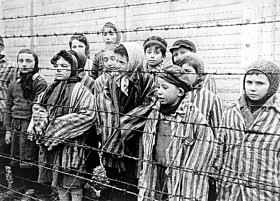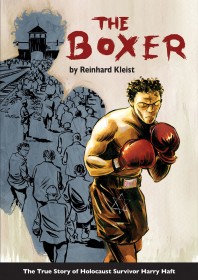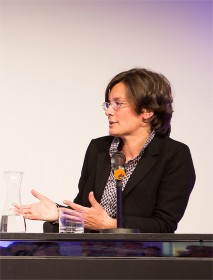
Surviving children in the main concentration camp, Auschwitz. This still from documentary footage shot by Alexander Voronzow shows Tomasz Szwarz, Alicja Gruenbaum, Solomon Rozalin, Gita Sztrauss, Wiera Sadler, Marta Wiess, Boro Eksztein, Josef Rozenwaser, Rafael Szlezinger, Gabriel Nejman, Gugiel Appelbaum, Mark Berkowitz, Pesa Balter, Rut Muszkies, Miriam Friedman, and Miriam and Eva Mozes. Licensed for the public domain by the United States Holocaust Memorial Museum.
Seventy years ago to this day, the Soviet Army liberated the death camps Auschwitz I and II. Almost ten years ago, the anniversary was designated International Holocaust Remembrance Day. Although I’ve been reflecting on representations of the Holocaust in art, literature, and philosophy for many years, I remain irritatingly little affected by today’s date, January 27. In most European countries, official events will once again collectively recall that breach of civilization and commemorate those who were systematically murdered. So too will Germany. Here, the decision to officially commemorate the victims of the Holocaust on this day was reached in 1996—not least because → continue reading

Cover of the Graphic novel © Reinhard Kleist, The Boxer, Selfmadehero 2014
Several of us at the Jewish Museum Berlin have observed that, over the last few years, the market for young adult literature has begun to demonstrate a growing interest in the subject of Nazism and the Holocaust. In the coming weeks, we will be introducing contemporary and classic works on this topic that we have read and discussed together.
What happened to the people who survived the concentration camps – what was life like afterwards? For their families, their children, the survivors themselves?
Alan Scott Haft’s father Hertzko Haft was a vicious and violent man, the polar opposite of what we would consider today to be a “good father.” Many years passed before Alan Scott Haft understood – and he didn’t really want to know – why his father was that way.
At some point he learned a little more: → continue reading

Dr. Karen Körber, the first scholar ever to benefit from the Fellowship Program of the Jewish Museum Berlin © JMB, Photo: Ernst Fesseler
The Jewish community in Germany has undergone a profound change in recent years—and the protagonists behind that change are the primary focus of research undertaken by Dr. Karen Körber, the first scholar of the Fellowship Program of the Jewish Museum Berlin. For the last two years Dr. Körber has been investigating “Daily Realities: Jewish Life in Germany Today” and she recently spoke to me about her findings.
Karen, the Fellowship Program of the JMB supports research into Jewish history and culture as well as into broader-ranging aspects of migration and diversity in Germany. You are the first person ever to complete the two-year Fellowship Program—a pioneer, so to speak—and I’d be interested to hear about that experience.
I found myself in a very open situation and was able to do much as I liked. All fellowship programs are fundamentally privileged set-ups but this particular one has the advantage of being attached to a well-endowed institution of international renown. → continue reading


